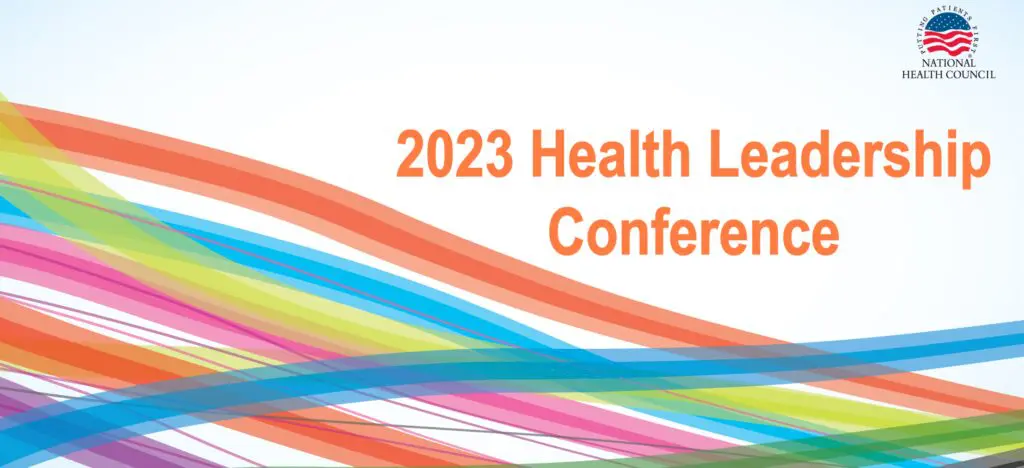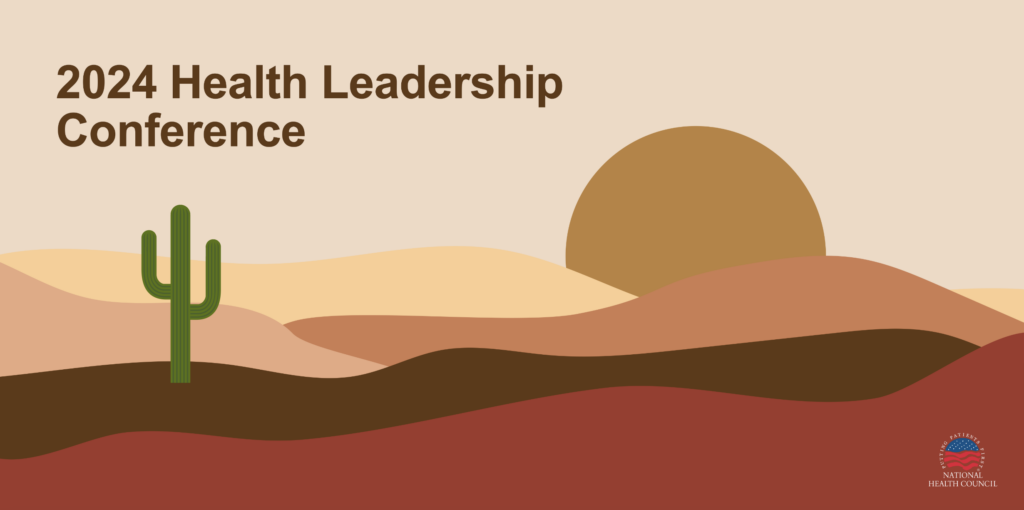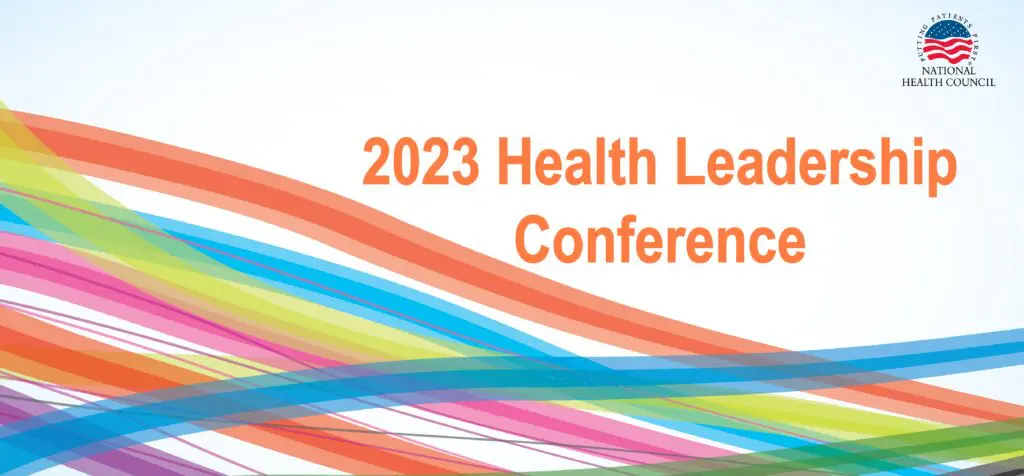
2023 Health Leadership Conference
- Event Date: Feb. 07 - 09, 2023
- Event Location: Coral Gables, FL
The National Health Council (NHC) gathered February 7-9 in Coral Gables, FL for the annual Health Leadership Conference. More than 130 NHC members, Board leaders, and staff connected with other leaders from the nation’s top patient groups and related nonprofits to learn about best practices for nonprofit health organizations, and emerging issues in health care policy. This year’s theme was Change Agents for Patient Health with speakers who focused on leadership, being a catalyst for change, building and driving momentum, and taking action.
View our conference photos.
Tuesday, February 7
Catalysts for Change – Nonprofit Leadership in Uncertain Times
Introduction by:
• Randy Rutta, CEO, National Health Council
Speakers:
• Sabeen Perwaiz, Executive Director, Florida Nonprofit Alliance
• Janetta Cravens, Senior Consultant for Governance and Strategy, BoardVeritas
During this session, patient group and nonprofit CEOs and their Board leaders discussed changes in giving and generational wealth will impact their ability to fundraise in the future and how that will affect their ability to carry out their missions. Speakers advised staff to be vulnerable about the true cost to run an organization, share that information with the Board and staff and rephrase as funding core mission work. Also, a one-size-fits-all approach does not work for all donor groups. Younger generations are looking to connect with places where they volunteer, and they want quick and easy tech savvy options for giving.
View speaker slides here and here.
Connect and Collaborate Session for Senior Staff
Senior leaders from NHC member organizations discussed topics of mutual interest including: Hybrid Workplace; Recruitment, Hiring, Retention; Fundraising and Resource Management; Patient Engagement; DEI and Health Equity; among others.
Opening & Networking Reception
Attendees enjoyed a lively opening night reception with music from a 6-piece music band. NHC Chief Executive Officer Randy Rutta provided opening remarks welcoming attendees to Coral Gables!
Wednesday, February 8
Opening Remarks and Conference Objectives
• Kenny Mendez, President & CEO, Asthma and Allergy Foundation of America (AAFA)
• Randy Rutta, CEO, National Health Council
NHC Board Chair Kenny Mendez and NHC CEO Randy Rutta welcomed attendees to the annual Health Leadership Conference. Mendez outlined his priorities as Board Chair and Rutta reviewed accomplishments the NHC has made against its 2022-2024 Strategic Plan.
Leverage: Innovation at a Tipping Point
Introduction by:
• Kenny Mendez, President & CEO, Asthma and Allergy Foundation of America (AAFA)
Keynote Speaker:
• John Nosta, Innovation Theorist
This session focused on the shifting roles of the physician, patient, and caregiver in today’s complex health care environment. This exploration on the future of health care enticed participants with the possibilities, while considering the fears that can hold us back from embracing new ways of doing things. John Nosta reviewed three key concepts of innovation: Digitization Leads, Dematerialization, and Demonetization, which are being seen across all areas of health care. We are amid a digital transformational event. GPT (AI) is inevitable and advancing quickly and getting more powerful. GPT and AI is what will push us in new directions with speed and adaptation to speed of change a key to success. Big data is expanding on three fronts at increasing rates – velocity, volume, and variety. A problem is that all data does not make its way to functionality. The ability to assimilate data is key to the success of our society. But there are many barriers to digital transformation. Cost and habit are the two biggest barriers to health care tech innovation. But it’s not just about innovation, it’s about sychronization, or the ability to synchronize multiple innovations. Bottom line: We are in the middle of a digital transformational event. Synchronizing digital transformation and adding adoption and usability to these transformations is critical. Leaders’ successes are tied to their ability to adapt with technology.
View speaker slides here.
Reactor Panel to Keynote
Moderator:
• Steven Taylor, President & CEO, The Arthritis Foundation
Panelists:
• Barbara Collura, President & CEO, RESOLVE: The National Infertility Association
• Calaneet Balas, President & CEO, ALS Association
This panel of NHC CEO leaders explored key questions arising from John Nosta’s Opening Keynote, including: How is your organization thinking about innovation and technology for your disease area? What are the opportunities, and fears that you observe? Panelists agreed that it is critical that the patient community engage with innovators to direct innovation in ways that meet real patient needs. Increasing access is also a significant barrier. A common struggle for patient organizations is engaging in the future while meeting the needs of today.
Lead: The Patient Advocacy Community’s Role in Assuring Better Access
Introduction by:
• Michael Osso, President & CEO at Crohn’s & Colitis Foundation
Speaker:
• Kenneth E. Thorpe, Ph.D., Chairman, Partnership to Fight Chronic Disease; Robert W. Woodruff Professor and Chair, Department of Health Policy & Management, Rollins School of Public Health, Emory University
Dr. Thorpe focused on how chronic disease is driving increases in healthcare costs. U.S health care spending is higher than in Europe, driven by higher costs and higher chronic disease prevalence. He asserted that advancing health equity could save trillions in health care costs. Examples included increasing access to primary care by addressing work force shortages, increasing staff diversity, and building on telehealth success during the COVID-19 pandemic. Other policy recommendations from Dr. Thorpe include addressing high out-of-pocket costs, reducing the prevalence of high-deductible health plans, cap or eliminate out-of-pocket costs for chronic disease medicines, and close health disparity gaps. Other barriers to access include formularies, step therapy, prior authorization, and PBMs. Dr. Thorpe encourages the patient community to invest in prevention, make lower out-of-pocket costs a reality, and focus on improved health outcomes across demographics. Collaboration is critical to making these changes a reality.
View speaker slides here.
Leverage: Current Policy and Advocacy Landscape
Introduction by:
• Jeff Todd, President & CEO, Prevent Blindness
Speaker:
• Kelly Brantley, Practice Director, Avalere Health
Annual HLC favorite, Kelly Brantley provided her insights on the health policy and political landscape. Brantley conveyed that ACA enrollment is at an all-time high. Medicaid/CHIP are also contributing to record insurance rates, but redeterminations are coming later this spring. She also said there is a huge role for the patient community to support redetermination to make sure people don’t fall through the cracks. Additionally, she shared that the Inflation Reduction Act has three major drug policy reforms: negotiation, inflation rebates, and Part D redesign. The patient community should play a leading role in implementing all of them. For PBM Reform, there is Congressional interest in transparency. The Administration is studying impacts as well. She also said there has been increased attention on behavioral health, though there are persistent policy gaps, such as parity, provider shortages, and equity. She encouraged patient groups to articulate their everyday experiences to influence policymakers. A final recommendation was for patient groups to place more focus on regulatory efforts than Congressional actions given the current political environment.
View speaker slides here.
Lead: Strengthening the Role of, and Respect for, Patient Generated Data
Introduction by:
• Lisa Butler, Executive Director, GBS/CIDP Foundation International
Speakers:
• William Lawrence, Senior Director, Patient and Provider Associations, Healthcare Solutions, IQVIA
• David Voccola, Senior Principal & Global Strategy Lead, IQVIA Integrated Health Practice
• Alexandra Weiss, Director, Nonprofit Strategy, Patient Advocacy, Healthcare Solutions, IQVIA
For over a decade, the tide of progress in human health has steadily shifted towards greater access and influence for patients – especially in the US. The team from NHC member IQVIA led a conversation on how this dynamic moment presents both towering opportunities and unexpected challenges for patient organizations. The team outlined a series of seemingly disparate events that led to this moment of opportunity with patient generated data. According to the IQVIA team, the ability to digitally follow a patient on their care journey is fast becoming a reality in the U.S. Investment is needed in modern real-world data capabilities that make EMR/HER data available. There is a paradigm shift on leveraging patient data for policy change and action. Optimization of electronic health records can help drive innovation forward. As a result of 21st Century Cures, patients own and can share their data with anyone, but the caveat is that there are for-profit companies that are attempting to get in front of patients before patient groups can leverage their data for their own purposes. All patient groups play a valuable role in capturing data that will help the life sciences industry, payers, and others to better understand treatment and therapies for a particular disease.
View speaker slides here.
Lead: A Fireside Chat about Progress on Health Equity
Moderator:
• LaVarne Burton, President & CEO, American Kidney Fund
Speaker:
• Wendy Ellis, Assistant Professor at GWU and Director, Center for Community Resilience at the Milken Institute
The nonprofit health and patient advocacy sector are critical community support elements in the lives of millions of Americans experiencing chronic health conditions. Dr. Wendy Ellis founded and leads the Building Community Resilience (BCR) collaborative which seeks to improve the health of children, families, and communities by fostering engagement between grassroots community services and public and private systems to develop a protective buffer against Adverse Childhood Experiences (ACEs) occurring in Adverse Community Environments (ACEs). Dr. Ellis asserted that the causes of health inequities are deep, generational, and institutional. Systems are designed to perpetuate inequities. And the nonprofit advocacy community plays an important role. ZIP codes are indicative of health outcomes and status, and generational stress can also affect health outcomes and add to disparities. Dr. Ellis discussed her truth and equity initiative in Cincinnati, which looked at the health impact of discrimination. She asserts that we can help communities come up with customized solutions by looking at how adversity has defined that community and helping to identify the assets and barriers present in a community. She encouraged patient groups to partner with marginalized communities on critical policy concerns, especially on issues such as child and maternal health, education, early childhood, foster care reform, and reproductive justice.
View video here.
View speaker slides here.
Leverage: Attendees “Show & Tell”
Hosted by:
• Leah Howard, President and CEO, National Psoriasis Foundation
• Eric Racine, Vice President & US Country Head, Public Affairs & Patient Advocacy, Sanofi
In this attendee favorite session, NHC Board members Leah Howard and Eric Racine hosted NHC members as they spent 5 minutes enlightening colleagues with success stories, “ah ha” moments, emerging best practices, pitfalls, partner opportunities, and other news to inform and inspire. Topics shared include:
- A large patient group has set a 2030 deadline in its strategic plan to speed up research. They have three pillars: research, care services, and advocacy.
- A smaller nonprofit shared that a top priority is passing on rebates at the point of sale to patients. They developed a Patient Pocket Protector coalition to pass rebate-pass through legislation.
- A patient group discussed its ASPECT program that trains people to share their It has had multiple benefits including advocacy, shifting the organization’s culture to be more patient-led, uncovering gaps such as mental health, and helping people advocate for their health.
- A CEO of a patient group recounted how she took the NHC show-and-tell format to their patient summit and called it their Patient Empower Hour, where attendees shared their inspiration.
- Another patient group CEO discussed their “Seize the Awkward” campaign with the Jed Foundation to encourage young people to talk to their friends and families who may be at risk of suicide. The campaign has been shared by important influencers, garnered 60m views online, and met its goal to encourage outreach to those at risk.
Partner Networking Reception
Attendees wrapped up the day by connecting with those they met throughout the day to network and discuss topics of mutual interest.
Thursday, February 9
Opening Remarks & Conference Reflections
Remarks by:
• Randy Rutta, CEO, National Health Council
• Charles D. Henderson, CEO, American Diabetes Association
• Michael Zincone, US Senior Director of Patient Advocacy, Pfizer
NHC CEO Randy Rutta welcomed attendees to the final day of the Health Leadership Conference. NHC members Charles Henderson and Michael Zincone shared their impressions of the Conference takeaways so far. Henderson invited attendees to extend themselves more grace, and Zincone focused on the importance of collaboration as a driver, distinct from consensus.
Lead: From Chief Executive to Chief Influencer
Introduction by:
• Sue Peschin, President & CEO, Alliance for Aging Research
Keynote Speaker:
• Anthony Shop, Chair, National Digital Roundtable; Co-Founder + Chief Strategy Officer, Social Driver
In today’s hybrid and remote work environment, senior leaders have no choice but to leverage new communications tools to reach and influence their audiences. But executives are right to wonder, “Is social media even safe for my brand these days? And is it the best place to find my audience?” Some of the most successful chief executives have embraced a new role: chief influencer. They inspire others to follow them – both literally and figuratively. Among the digital channels available, LinkedIn has emerged as the go-to social media platform for leaders to interact with their colleagues, their customers and the communities who matter. Digital influencer Anthony Shop inspired attendees to demonstrate thought leadership in their industry, build their brand among partners, recruit the best talent for their organization, and engage their current workforce. Shop asserted that if you aren’t an influencer, you can’t be as influential in meeting your mission. Chief influencers start in the center, embrace the gray, elevate others, learn the lingo, and go for growth. He encouraged attendees to think of LinkedIn not as a megaphone, but as a networking event. Executives’ LinkedIn pages get eight to 20 times the engagement of their company’s account. He encouraged everyone to think of one step they can take to embrace the role of Chief Influencer.
View speaker slides here.
Leverage: Attendees “Show & Tell”
Hosted by:
- Diana Gray, President & CEO, Hydrocephalus Association
- Devin Jopp, CEO, Association for Professionals in Infection Control and Epidemiology (APIC)
In the second “Show & Tell” session, NHC Board member Diana Gray and new member Dr. Devin Jopp hosted NHC members as they spent 5 minutes enlightening colleagues with success stories, “ah ha” moments, emerging best practices, pitfalls, partner opportunities, and other news to inform and inspire. Topics shared include:
- A CEO shared how she motivates a staff of 12 people from various parts of the world with diverse global perspectives. She encourages them to think, “If it does not exist, build it.”
- A Board member from a small patient group discussed a PCORI award to address the care gap in the transition from pediatric to adult care and associated patient reported outcomes. The organization focused on building their online presence since the COVID-19 pandemic.
- A nonprofit CEO discussed bringing together an alliance representing patient, scientific, industry, academy, and others to improve the health of America. The group, named Coalition for Trust in Health Care, Public Health, and Science, aims to strengthen people’s confidence in the health care ecosystem.
- A nonprofit CEO reviewed their campaign to drive the implementation of the strategy to align patient advocacy, and educate policy makers on the national strategy to strengthen the process of federal coordination to support family caregivers.
- A patient group CFO discussed how their group created a foundation to empower patients. They have nearly 70 coordinators to engage patients and speak about data, infusion supplies, and peer-to-peer action.
- A patient group CEO discussed her big aha moment: that youth are coming with a great energy to engage in the work and unique perspectives on how and what to do. The organization developed “Next Gen Prevention,” including a new strategic plan and direction.
- A patient group CEO discussed how their organization decided to be proactive in collecting data on their patients. They partnered with Verily, a Google subsidiary, to collect data on patients and coupled it with the historical data the organization had previously collected. The speaker encouraged other patient advocacy organizations to partner with these types of for-profit organizations to enrich their patient data collection efforts.
Leverage: The Relationship Between Philanthropy and Mission Impact
Introduction by:
• Schroeder Stribling, President & CEO, Mental Health America
Speaker:
• Kevin Allan, Executive Vice President, Changing Our World
The past several years presented both tremendous challenges and opportunities in the health ecosystem. The philanthropic community is a critical partner to the nonprofit health sector in driving progress for patients. This session explored both sides of the partnerships creating the future of social impact. Kevin Allan asserted that to be the exception to the rule, patient groups need to reframe how we think about fundraising. Allan provided 10 tips for leaders, including:
- Understand and prioritize lifetime donor value
- Put the welcome mat out
- Remove fundraising silos
- Remove the fundraising and communications divide
- Listen to your donors
- Reframe the questions you ask
- Upskill your staff, leverage your data, and get more out of it
- Ensure this critical relationship is a strong one
- Recognize you are a fundraising expert, but…
- View fundraising as a culture, not a department
View speaker slides here.
Closing Remarks
Remarks by:
• Jeff Todd, President & CEO, Prevent Blindness
• Randy Rutta, CEO, National Health Council
NHC CEO Randy Rutta and NHC Chair-Elect Jeff Todd thanked attendees, staff, and sponsors for a great Conference and provided an overview of upcoming NHC meetings and events.
Click here to view the meeting summary of the 2022 Health Leadership Conference.


